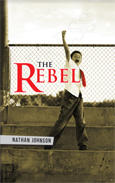
 |
Childhood is one of the most tenuous and sensitive periods of the human lifespan. Individual experiences will often dictate demeanor and personality as adulthood approaches. In Johnson’s work, the main character, John Cooper, navigates this period valiantly yet faces obstacle after obstacle stemming from an abusive father who clearly plays favorites in the worst of ways. Upon digging deeper, John is undoubtedly a rebel in the sense that even from a young age, he was unafraid to stand up to injustice for the mere sake of conformity and “falling in line.”
Early on in the work, Johnson establishes John as a no-nonsense character when he stands up to Bruce, the bully. In essence, the definition of a rebel is redefined in this work as an advocate, someone who gives a voice to the silenced, whether that is in the home or on the school playground. The key, perhaps, is to ascertain when that advocacy crosses the lines and becomes a need for belligerence and hostility, a lesson that John learns the hard way when his social influences sway him toward the dark side.
For the most part, Johnson’s prose is driven by a back-and-forth dialogue that creates a more frenetic pace to keep the action going. In Part II, “The Gang for Troubled Children,” John reflects on starting his own gang with Butch Jones and the lawlessness and excursions that followed. The dysfunction and chaos reach a head when John is arrested, creating a crossroads moment for his mom to decide between her kids and her abusive husband. Tragically, the theme that can be gathered from this portion is just how common such occurrences are and just how difficult it truly is to reroute the kids back onto the righteous path.
As the narrative unfolds and more backstory unravels, audiences become privy to the traumatic past of John’s own father and the idea that we become our parents in one way or another. What’s even more tragic is that the loved ones of these perpetrators are prone to give the individual opportunity after opportunity to rehabilitate themselves, and as is the case for the Cooper family, the rehabilitation rarely happens. Hope comes in different forms, but it is what keeps the wheels to life turning, and the life of John Cooper is no different. For John, that hope is Georgia, and it is up to him to not screw it up the way his father did.
Ultimately, the author uses the Cooper family to deliver a wealth of meaningful thematic content. However, relationships are truly what drive Johnson’s plot. This is seen especially in the dichotomy between what a strong relationship looks like, as with John and Georgia, and an utterly hopeless one, like that of John’s parents. Strong doesn’t necessarily always mean smooth, but that delicate balance is what makes a relationship refreshing. Above all else, Johnson’s work speaks to the age-old theme of nature versus nurture and not allowing history to repeat itself. It also cautions against leveraging one’s own history as an excuse for why one can’t be the best version of oneself.